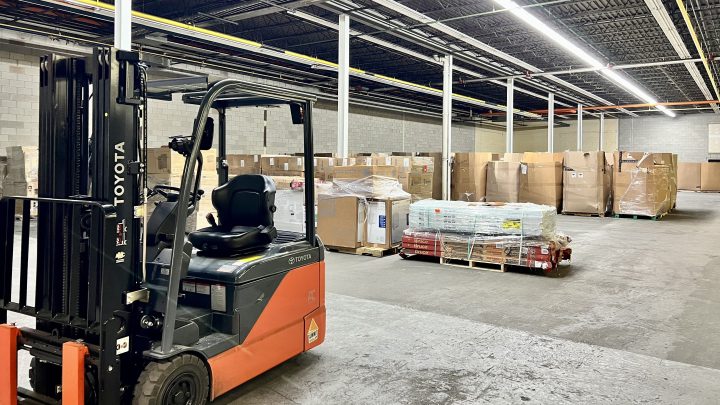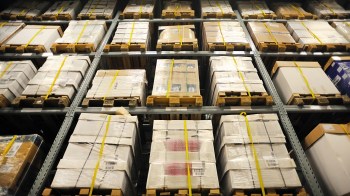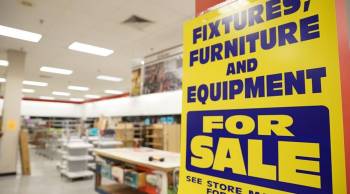
Inside the booming business of reselling returned merchandise
Inside the booming business of reselling returned merchandise

Recently, Marketplace got a close look at the operations of a Costco returns warehouse. Today, we’re focusing on where a lot of those returns end up: liquidators, the third-party sellers focused on buying and reselling returned or damaged goods.
It’s 9 a.m., and the box trucks are already arriving at American Liquidations in Connecticut.
“So the one that just rolled in came from Amazon,” said co-owner Dasti Llenga. “This has a mix of apparel and shoes.”
American Liquidations buys truckloads of overstock, returns merchandise and resells it — not to everyday shoppers looking for a deal, but to other businesses. Their customers are places like scratch-and-dent stores or individuals who are willing to buy a full pallet of random goods, break them down and resell them on sites like eBay and Poshmark. That’s actually how Llenga got his start.
“My first pallet — I purchased it for $1,800, delivered to my house, threw it on Facebook Marketplace and a guy gave me $1,100 and a Ford Escape for it,” he said.
Kind of an odd deal. But after selling the SUV, Llenga made a profit of $1,300, which he reinvested.
“One pallet turned into two pallets. Two pallets turned into three. It started as a side business and then just kind of blew up out of nowhere,” he said.
Liquidation is a growing part of retail. In 2022, Americans returned $800 billion worth of merchandise, according to the National Retail Federation. Because it’s so time and labor-intensive to sift through returns, many retailers sell them to third-party sellers: liquidators.
Everyone from publicly traded companies to individuals working out of their garages play the liquidation game. And the industry is growing beyond household names like T.J. Maxx and Marshalls.
Llenga left his job as a private equity analyst a couple of years ago to do this full-time. Today, American Liquidations has eight employees and 40,000 square feet of warehouse space. It feels like organized chaos, with neat rows of random goods — everything from lawnmowers to hand lotion.
“You know, it’s a big risk to take on a space like this,” Llenga said. “It’s a lot of overhead, it’s a lot of moving parts that you got to figure out before, you know, taking that leap of faith where you’re, you know, making a commitment with these retailers.”
Companies like Target and Macy’s only sell returned merchandise by the truckload. Llenga purchases up to 60 truckloads a month, with each holding around 25 pallets. And he purchases them sight unseen, so every delivery is literally a giant mystery box.
“Sometimes, we’ll get home runs and sometimes we’ll just get a bunch of stuff that ends up in the trash,” he said, pointing to a section of items from Home Depot.
What’s a home run?
“These are brand new doors. These things retail for thousands of dollars apiece. You know, someone who was a builder, they’ll have material there to build their houses or do a project at home or even resell the items for more money,” he said.
And what’s a dud? “These Christmas trees,” he said. “Like, this is going to be a hard item to sell.”
It’s January. Christmas is a full year away. And the trees are a little junky looking. Their branches poke in all directions, like they’ve been used or were on display at a store. This is a big part of the liquidation game: finding the treasures buried in the trash.
Across the room sit rows of pallets from Sam’s Club. Each is wrapped in plastic, so you can only see the products on the outside. We spy a Ninja coffee maker, Hunter rain boots and Bounty paper towels.
“People love that stuff, because Bounty paper towels, that’s a $20 package right there, $25,” he said.
This Sam’s Club haul has a retail value of up to $85,000. Llenga only pays a fraction of that. His profit is around 35%.

And remember, Llenga is really the middleman here. He sells to people like Mark Dumschott, who’s browsing at American Liquidations’ nearby storefront. By day, he installs sprinkler systems. Reselling is his family’s new side hustle.
“I come down probably twice a day to see what they have for tools, because the turnaround is like incredible,” he said. “I can’t believe how much stuff comes in and out of here.”
Dumschott buys pallets, opens them up, photographs the items and sells them on eBay. And lately, people have become curious about all the stuff sitting in his garage.
“Oh, where’d you get it, where’d you get it?! Ah, I can’t tell ya. I can’t tell ya. I ain’t giving out my secret,” he laughed.
The last pallet his family bought was shoes. He said they made around $10 a pair.
There’s a lot happening in the world. Through it all, Marketplace is here for you.
You rely on Marketplace to break down the world’s events and tell you how it affects you in a fact-based, approachable way. We rely on your financial support to keep making that possible.
Your donation today powers the independent journalism that you rely on. For just $5/month, you can help sustain Marketplace so we can keep reporting on the things that matter to you.

















